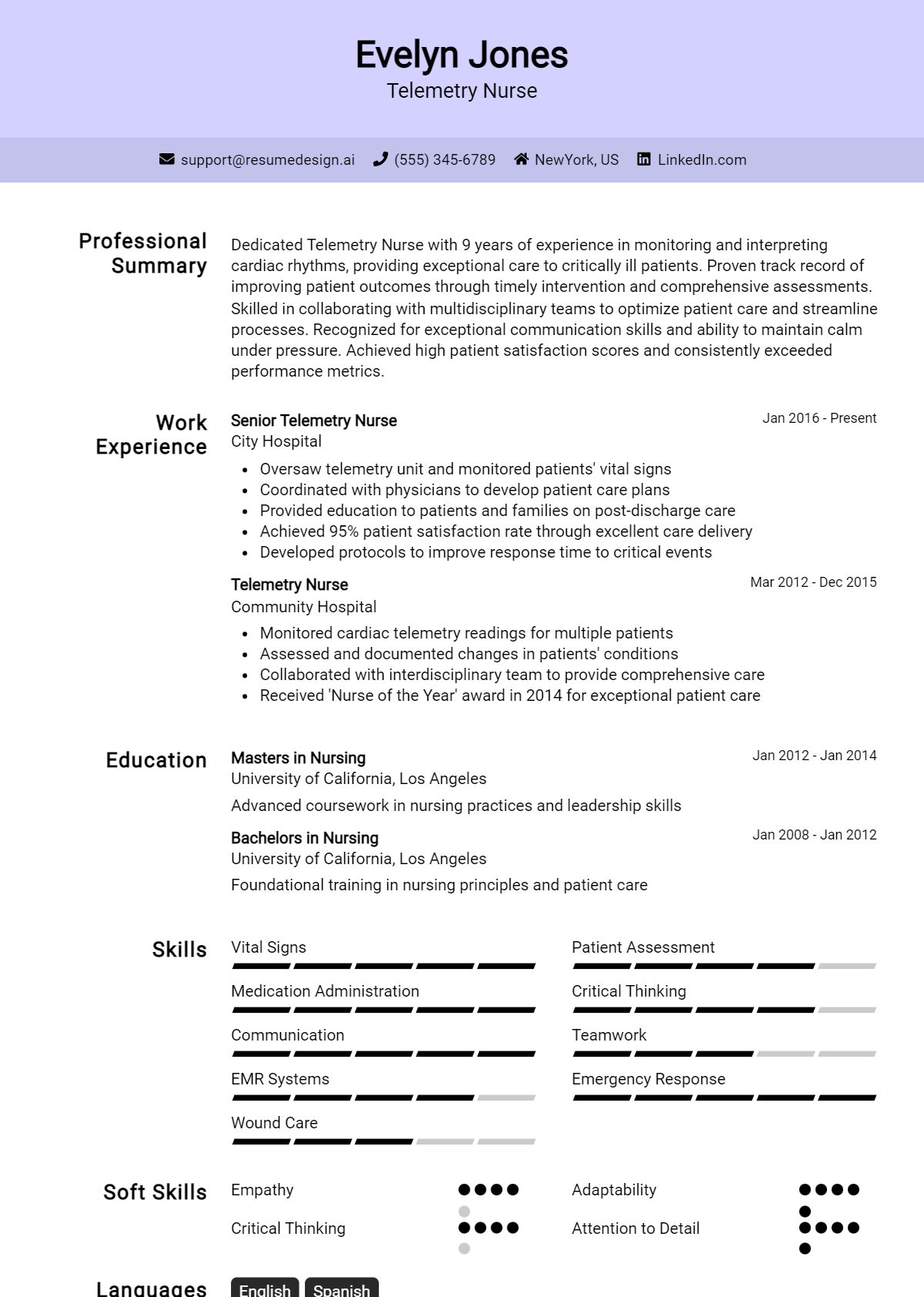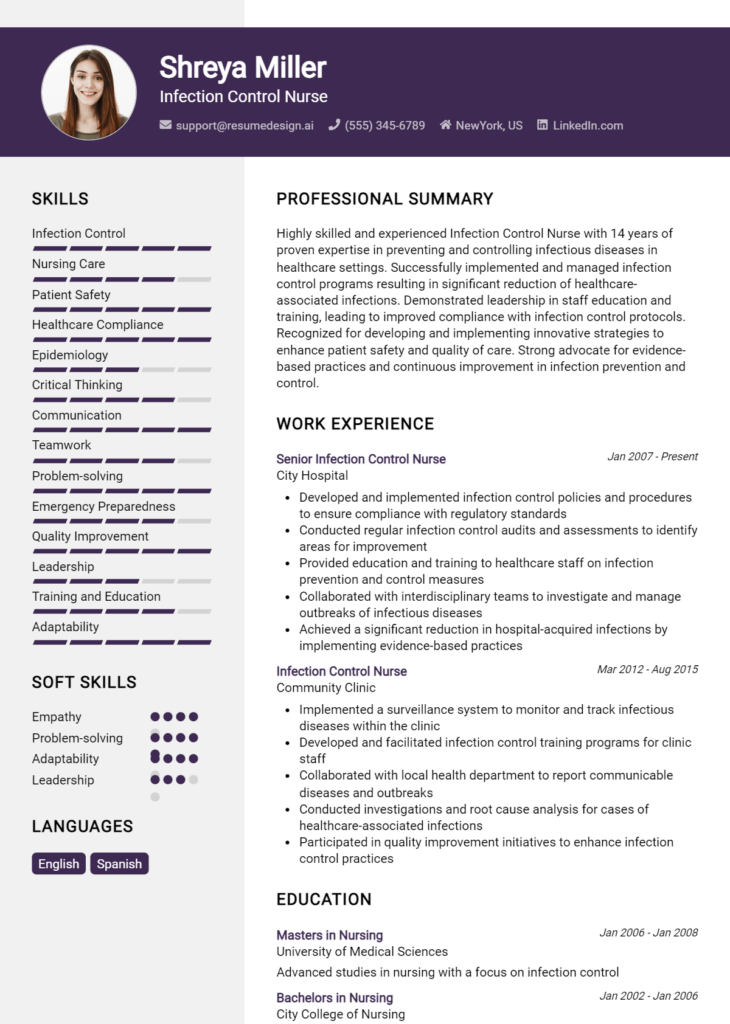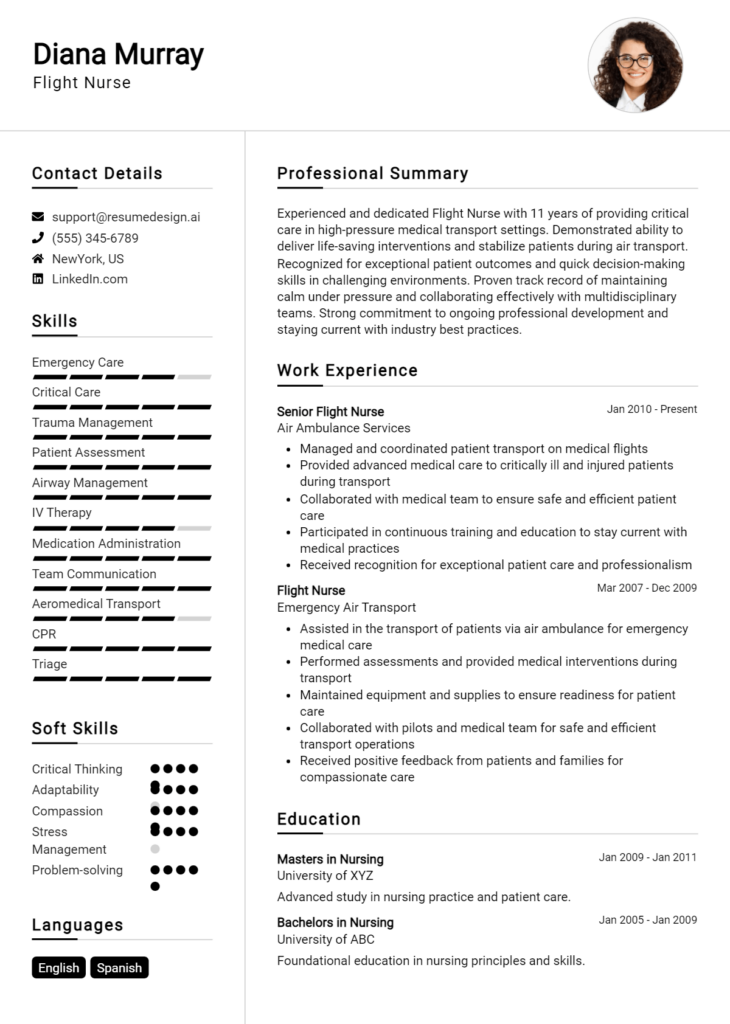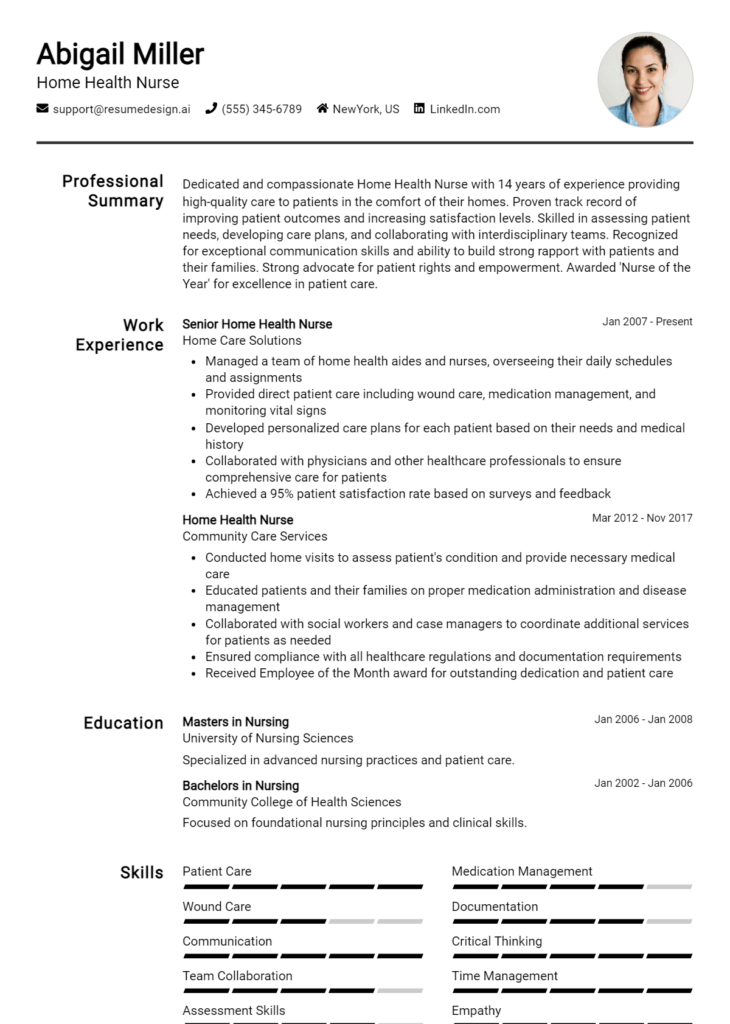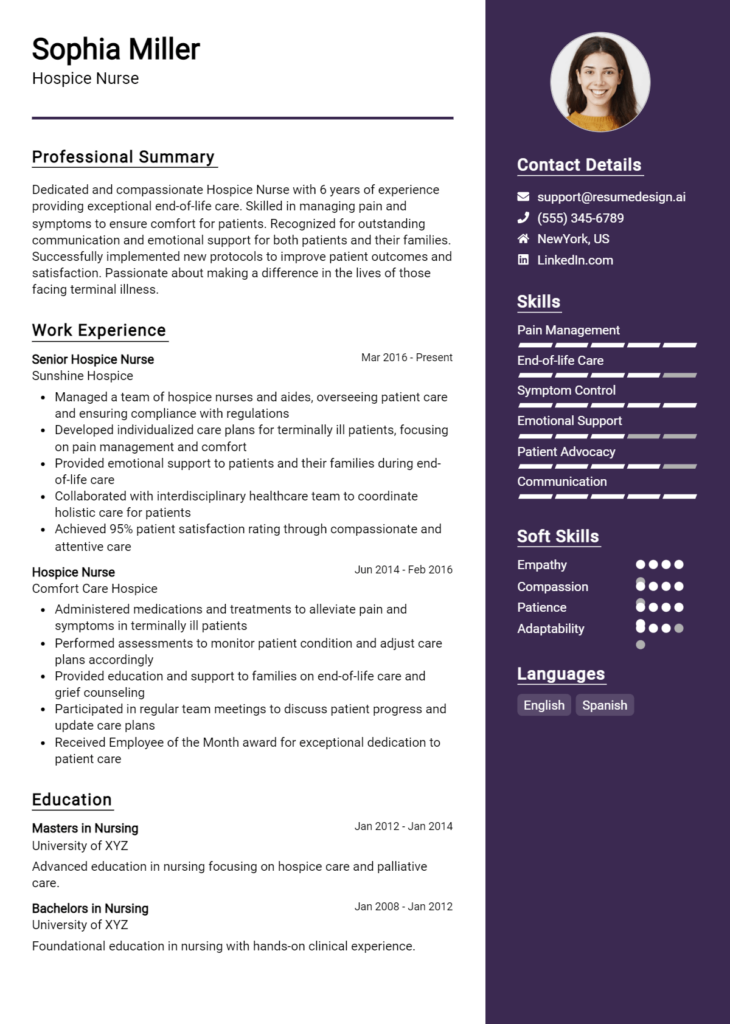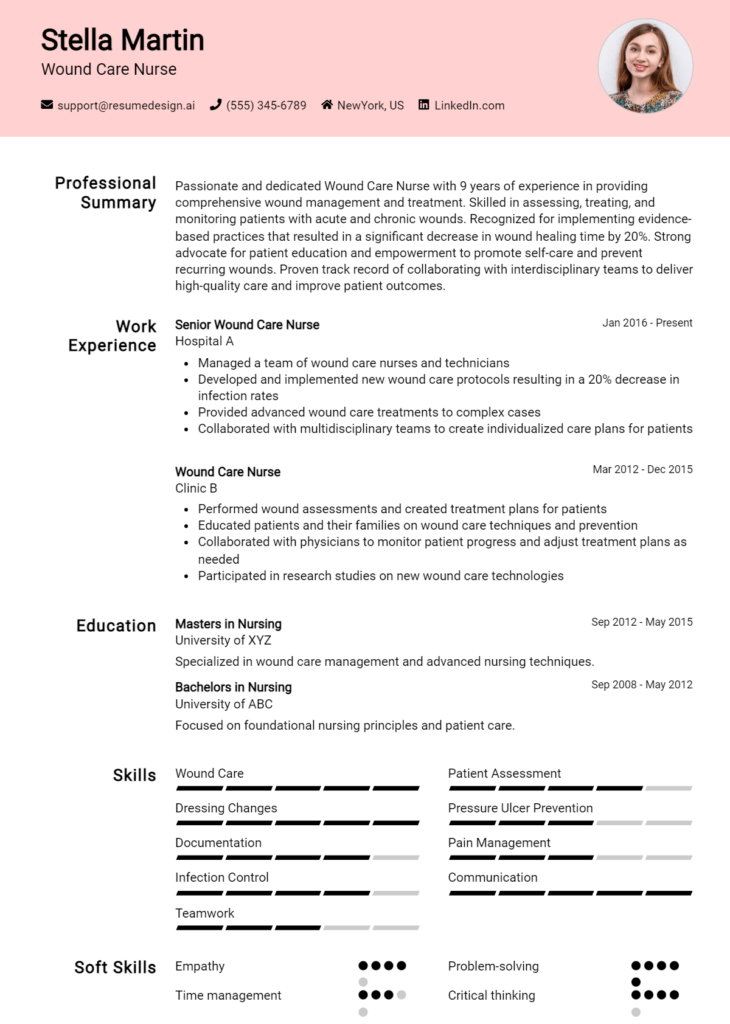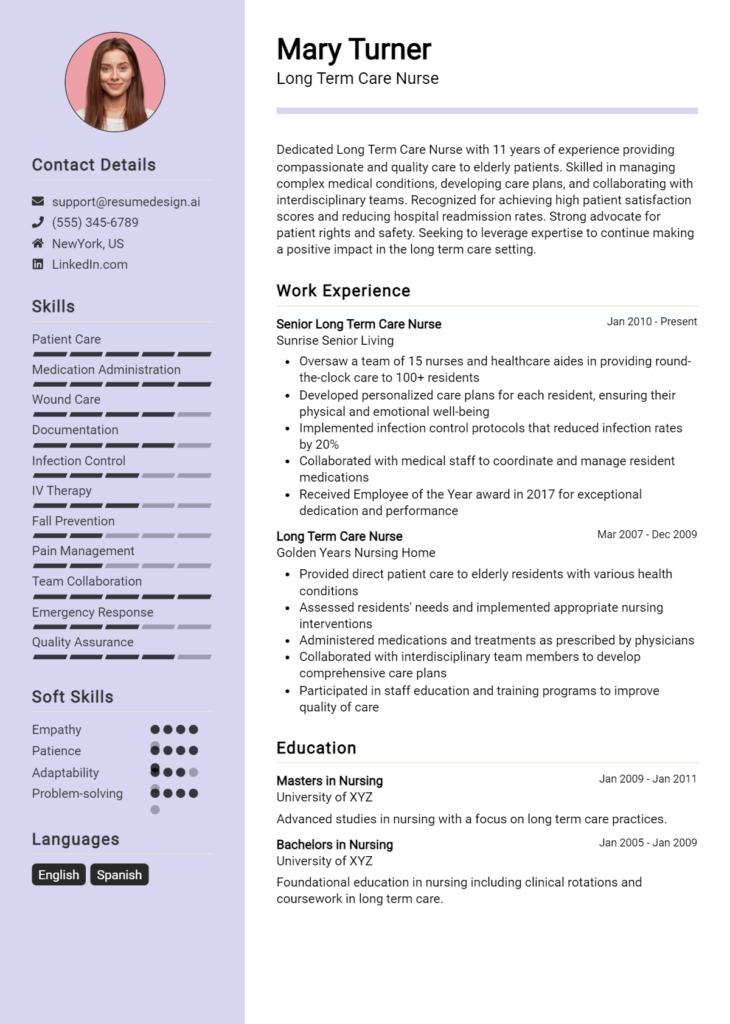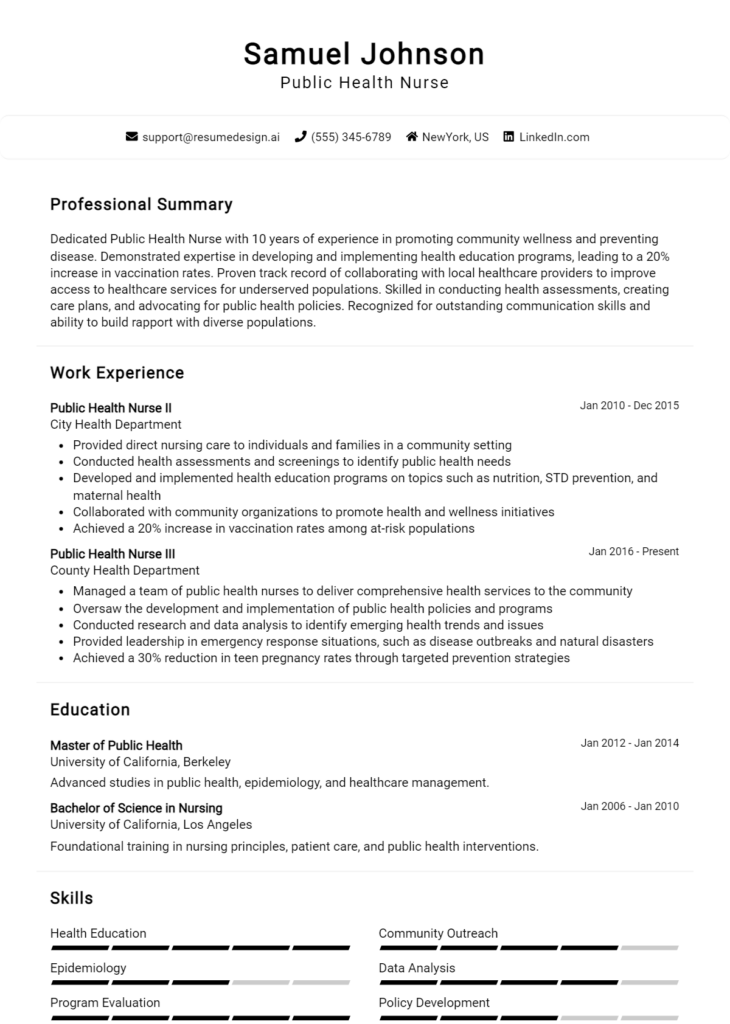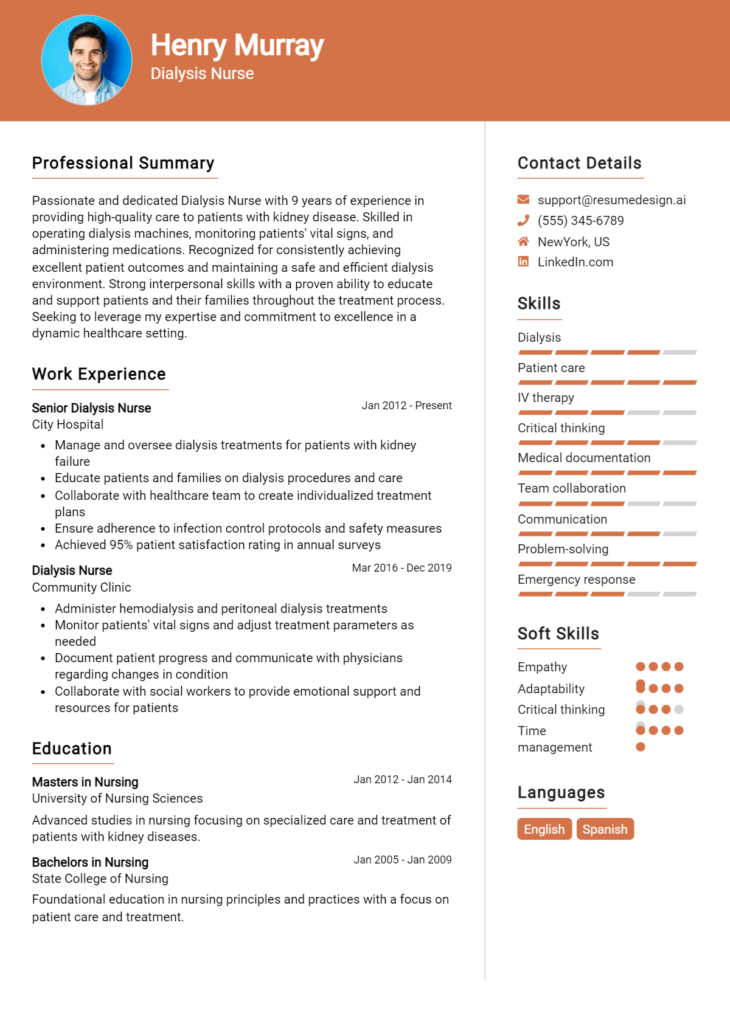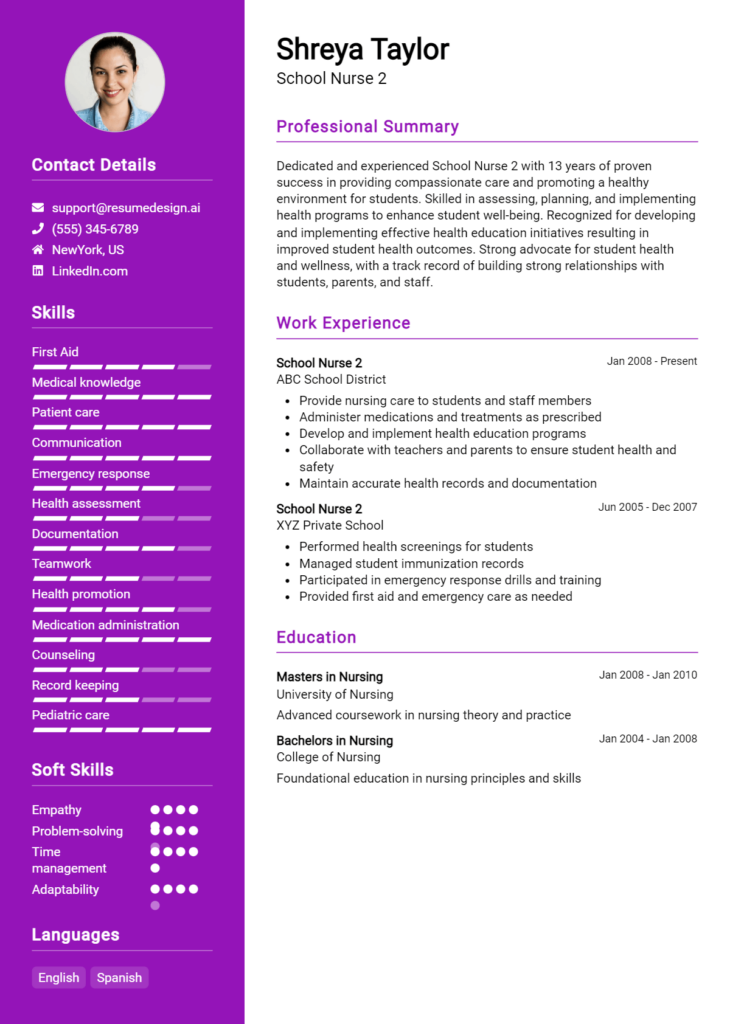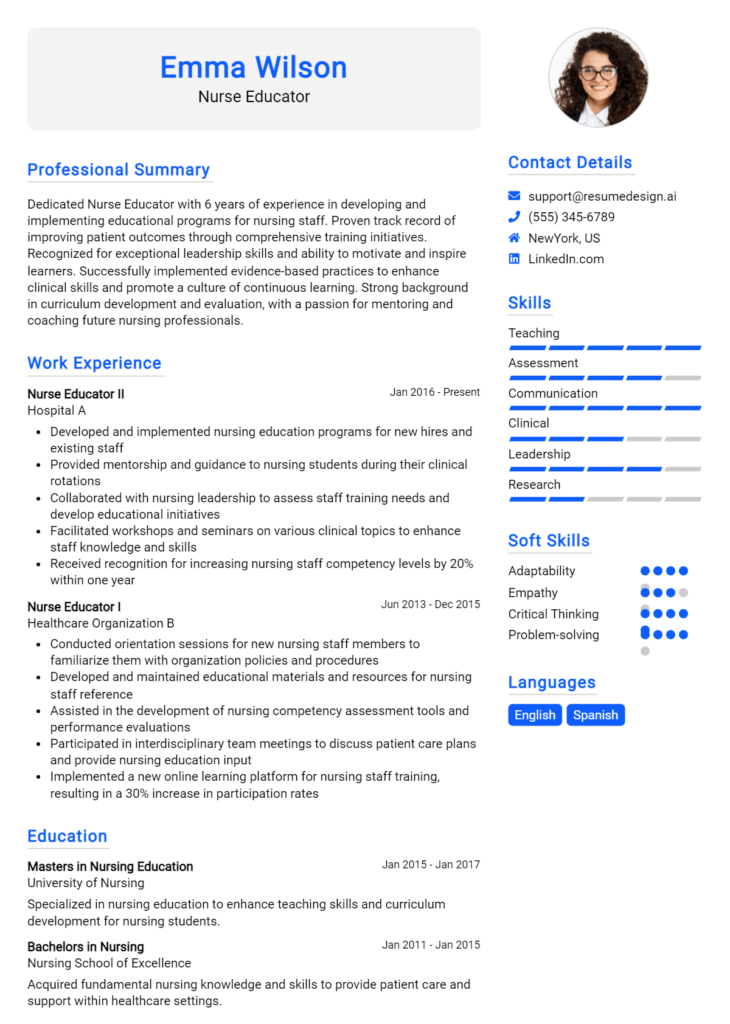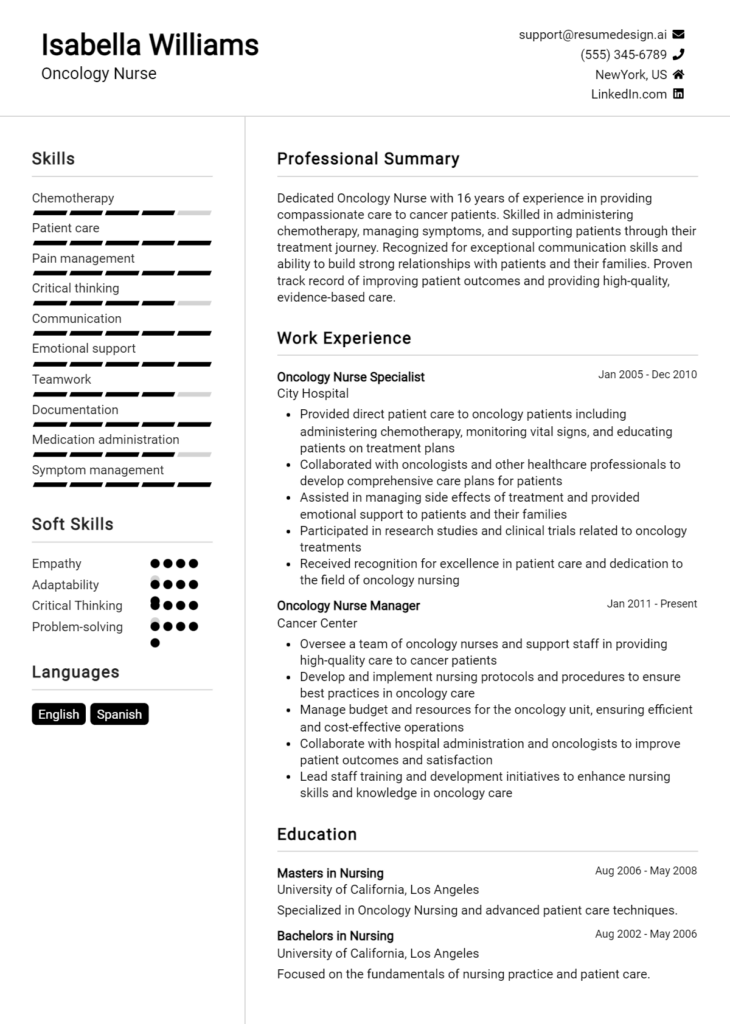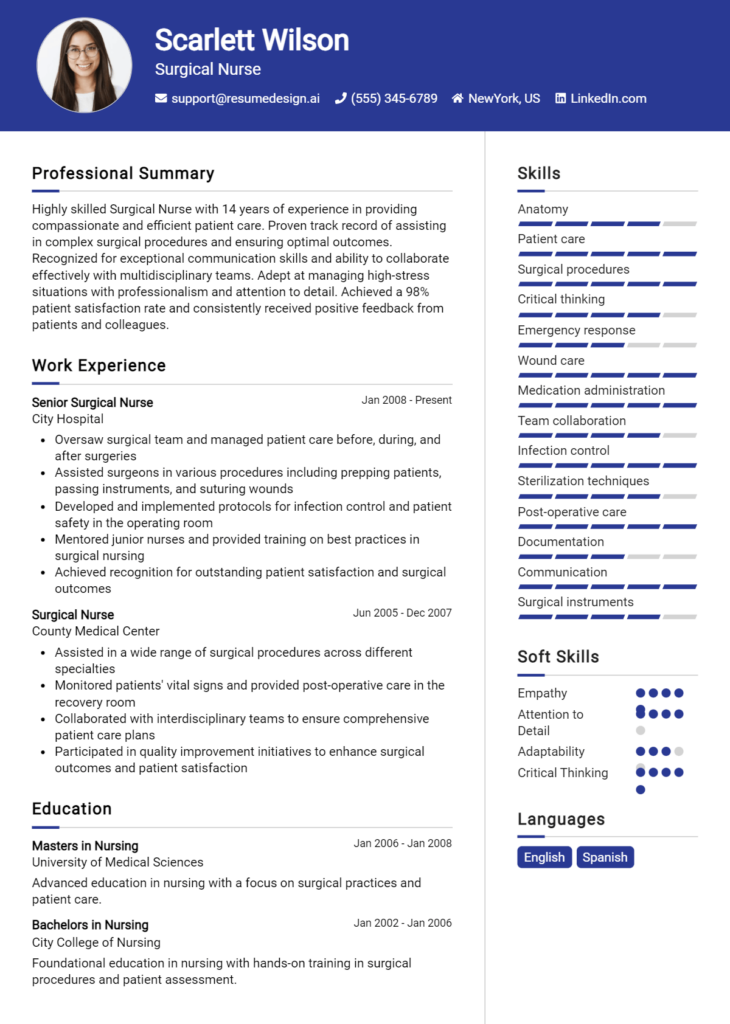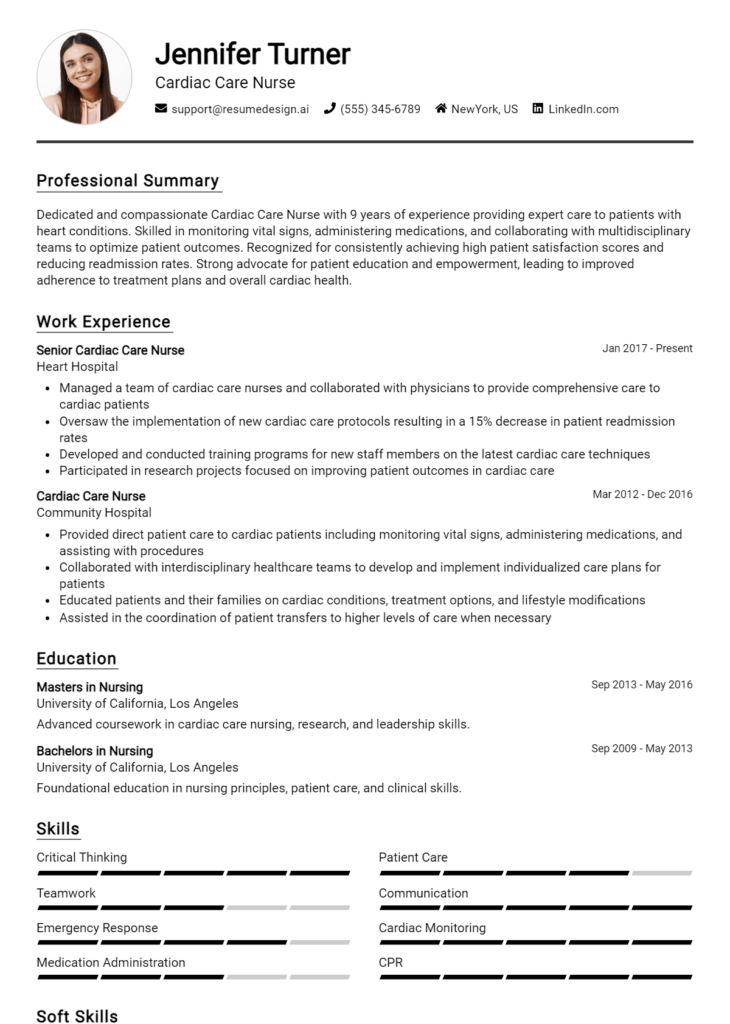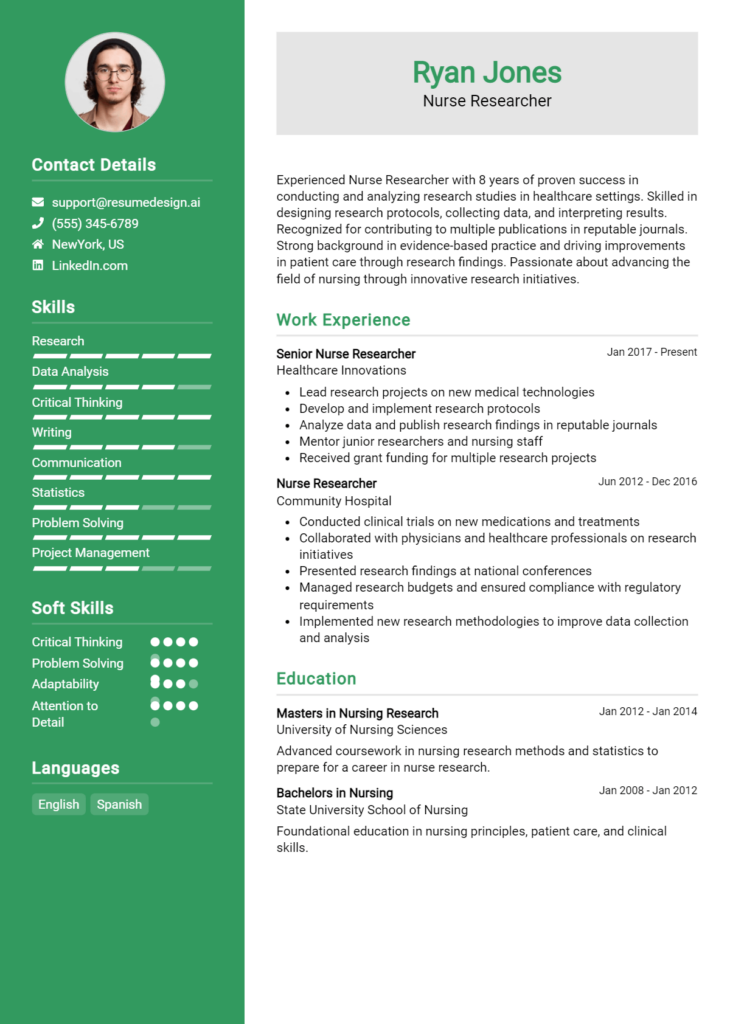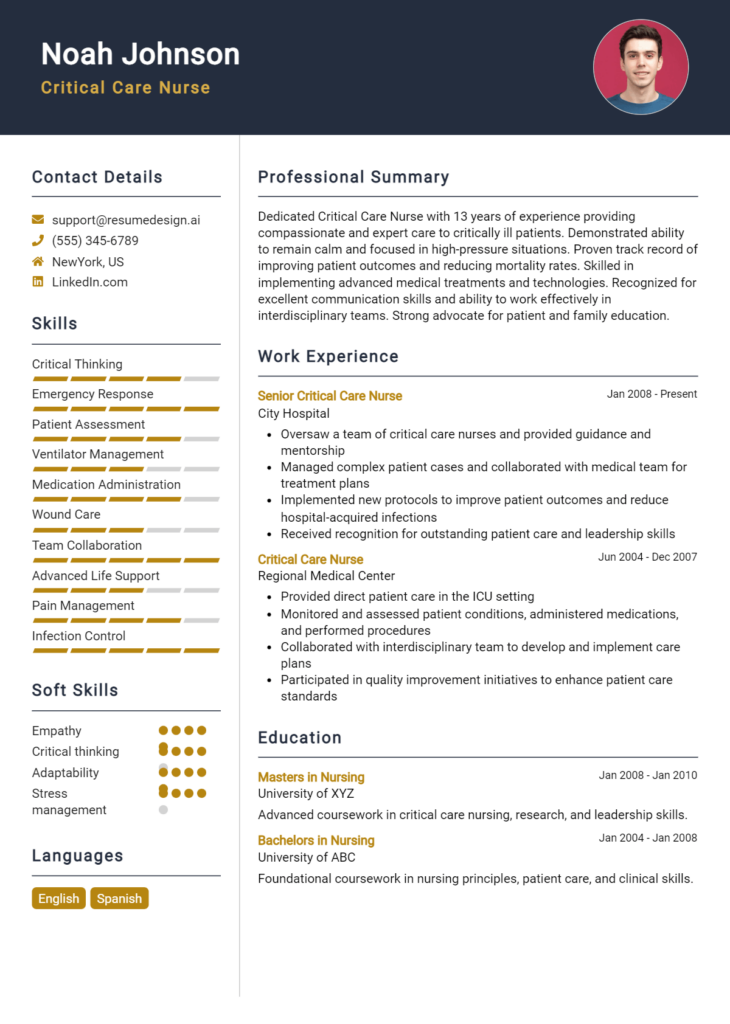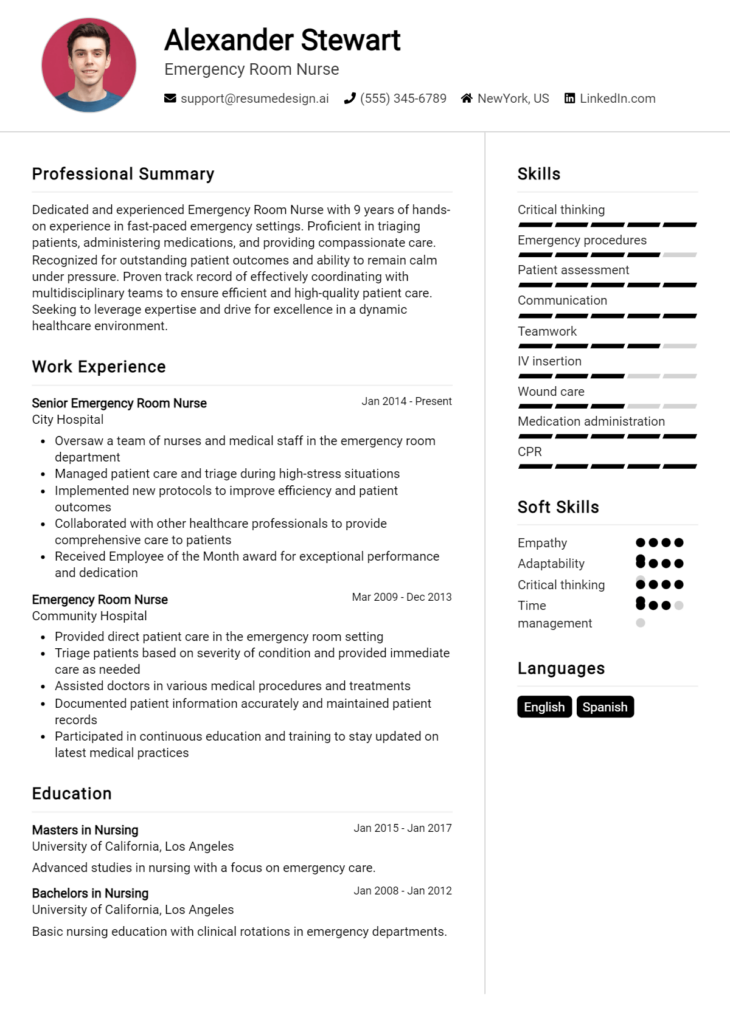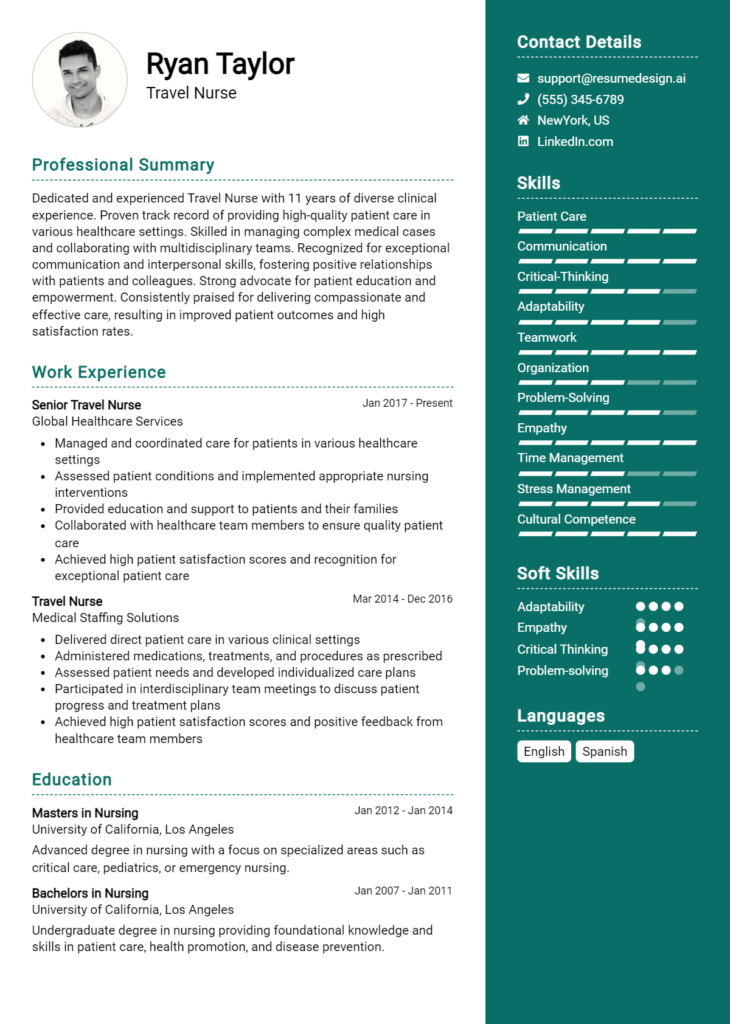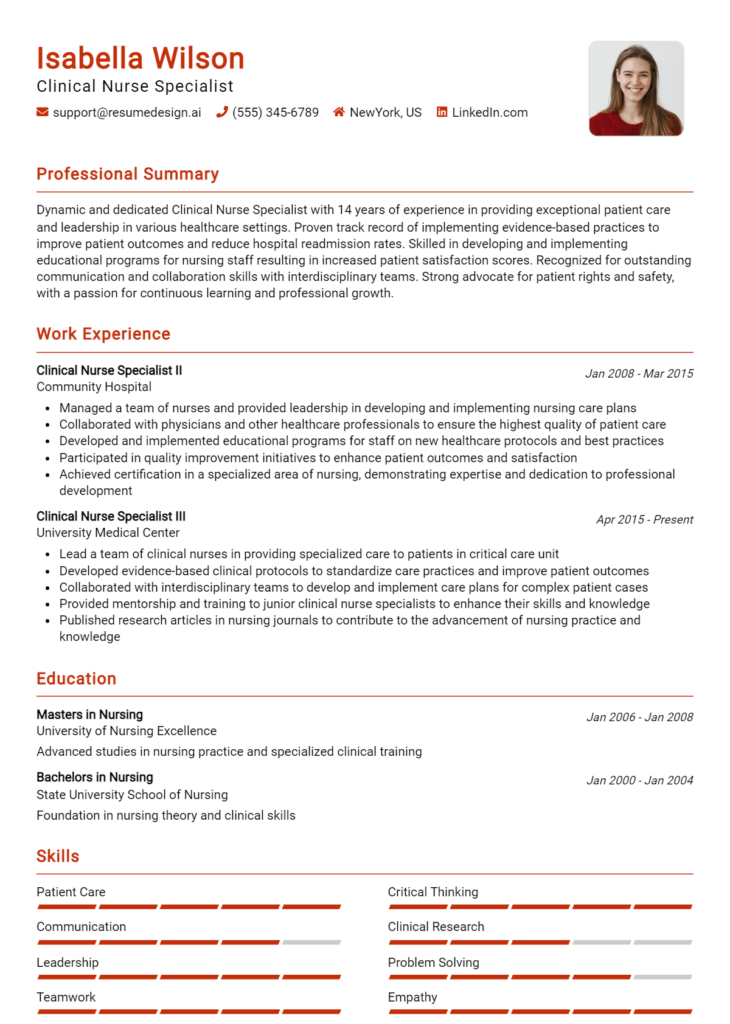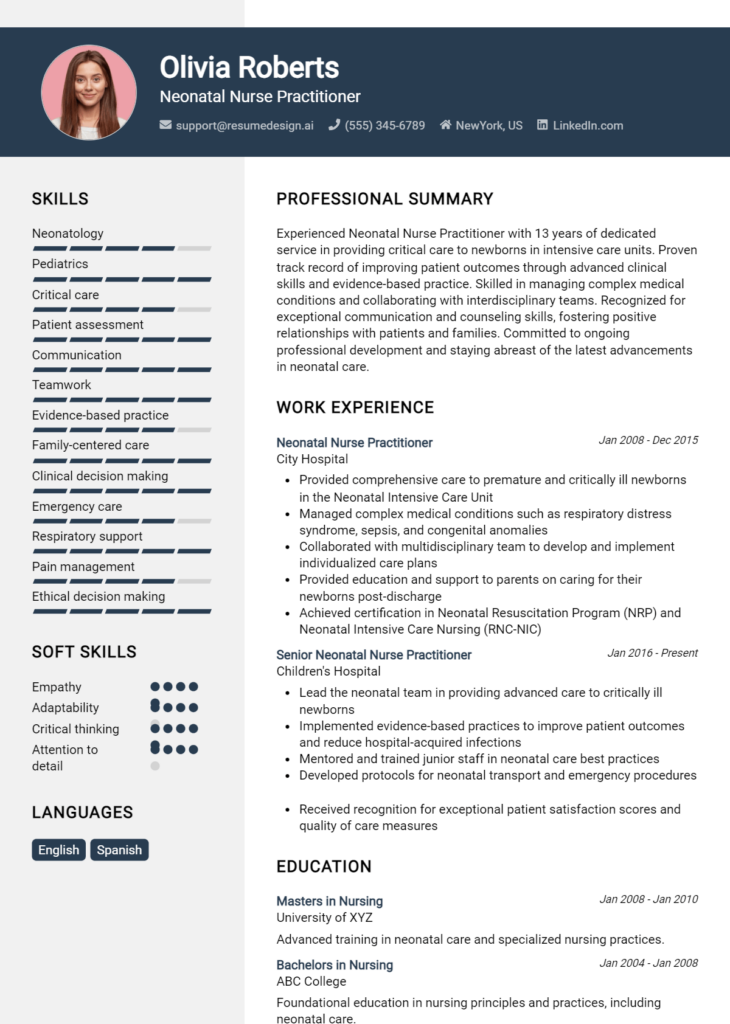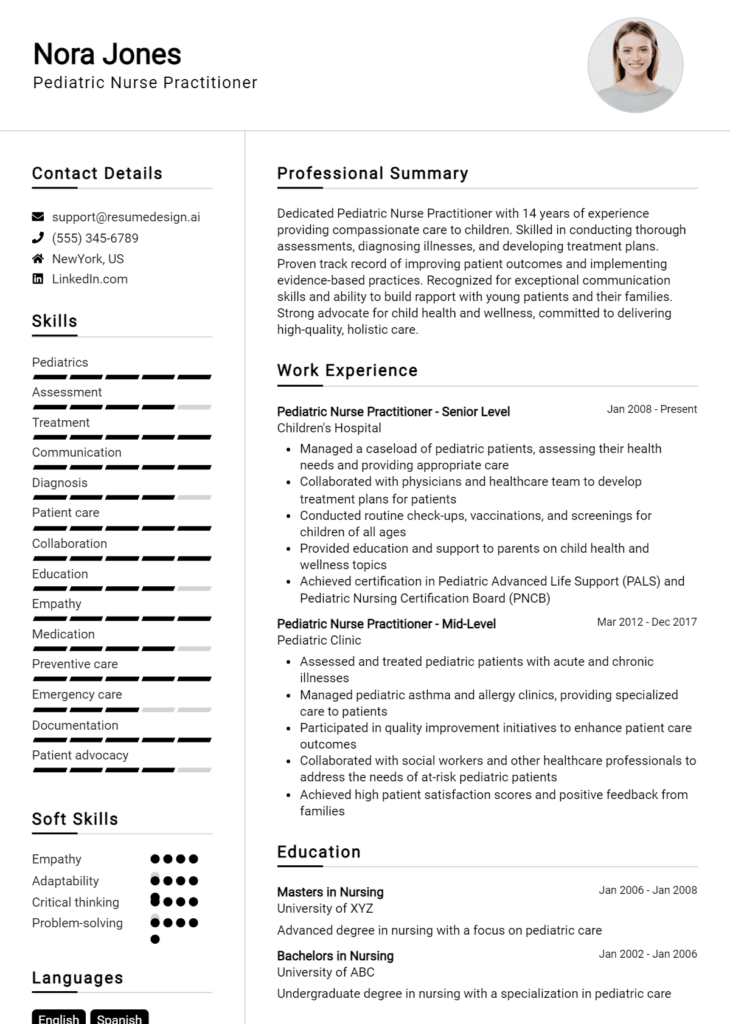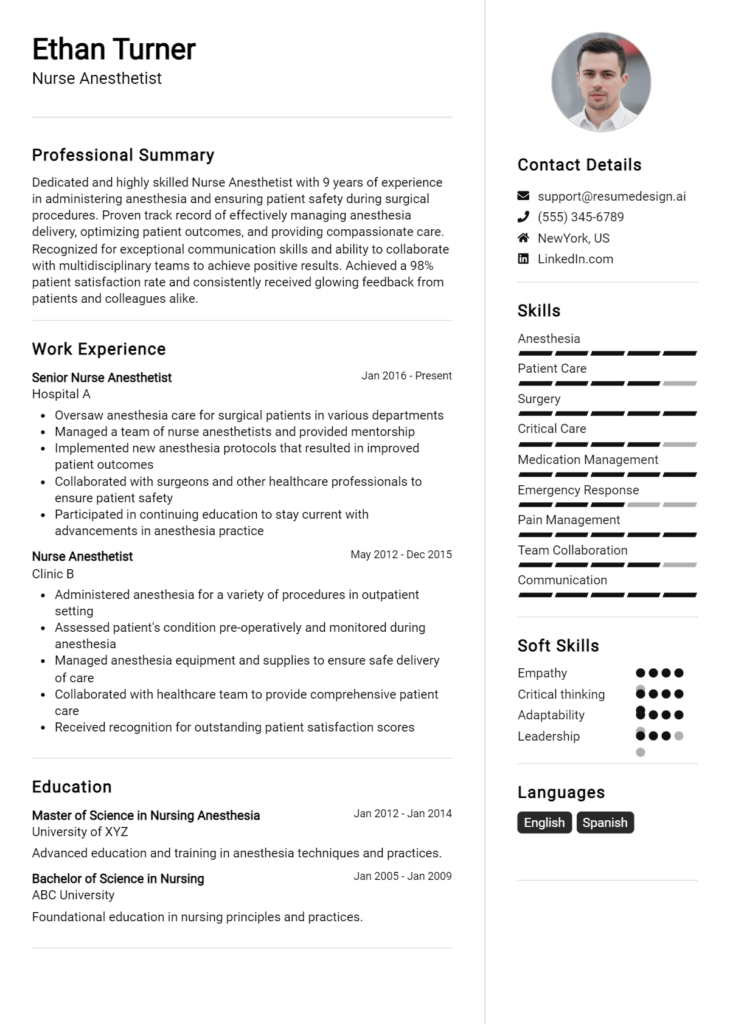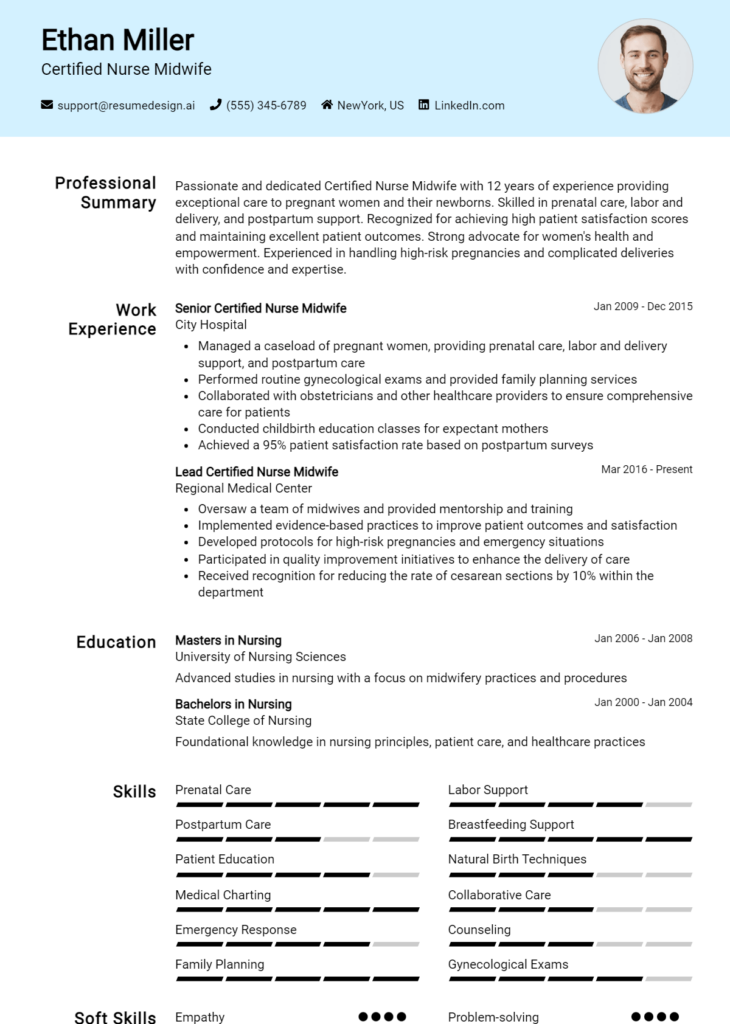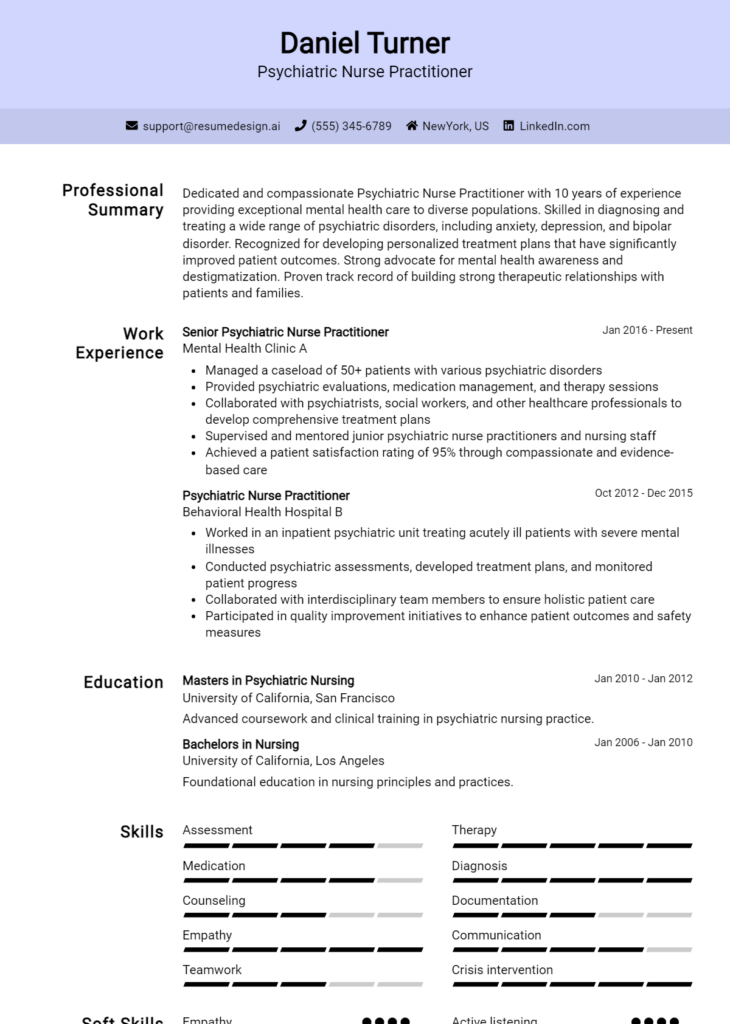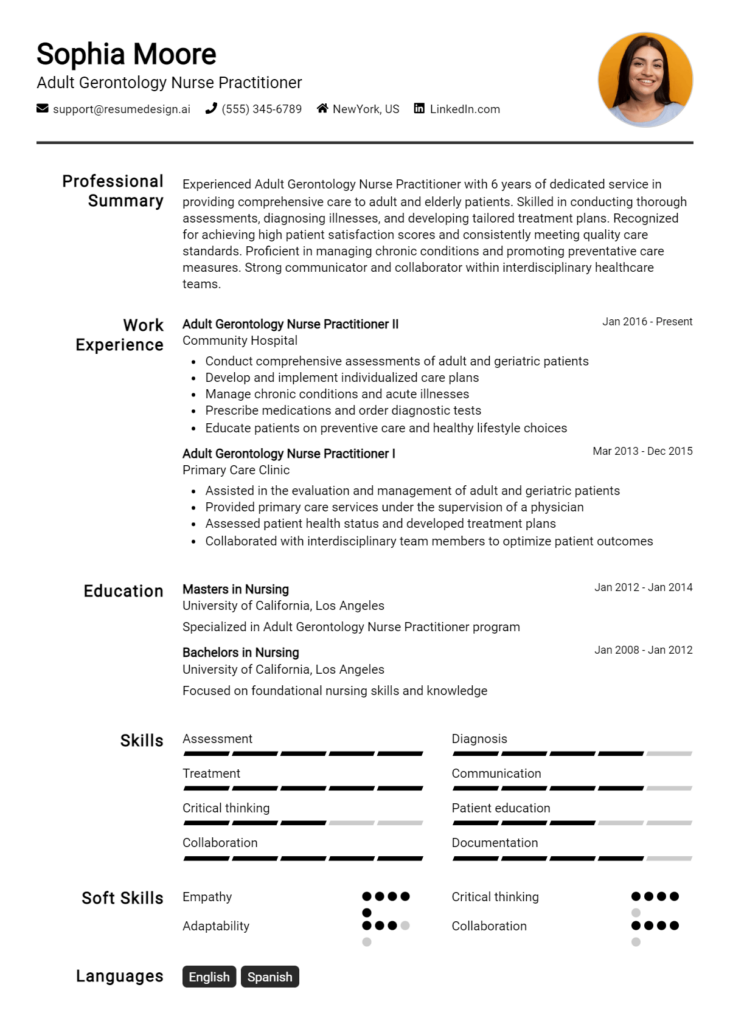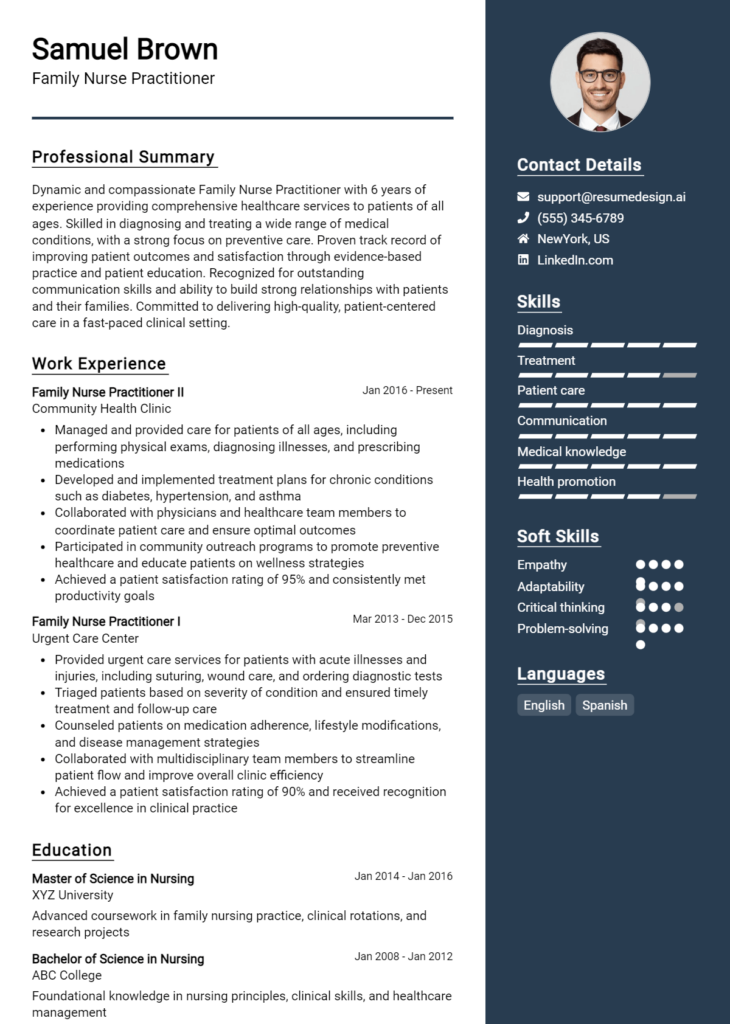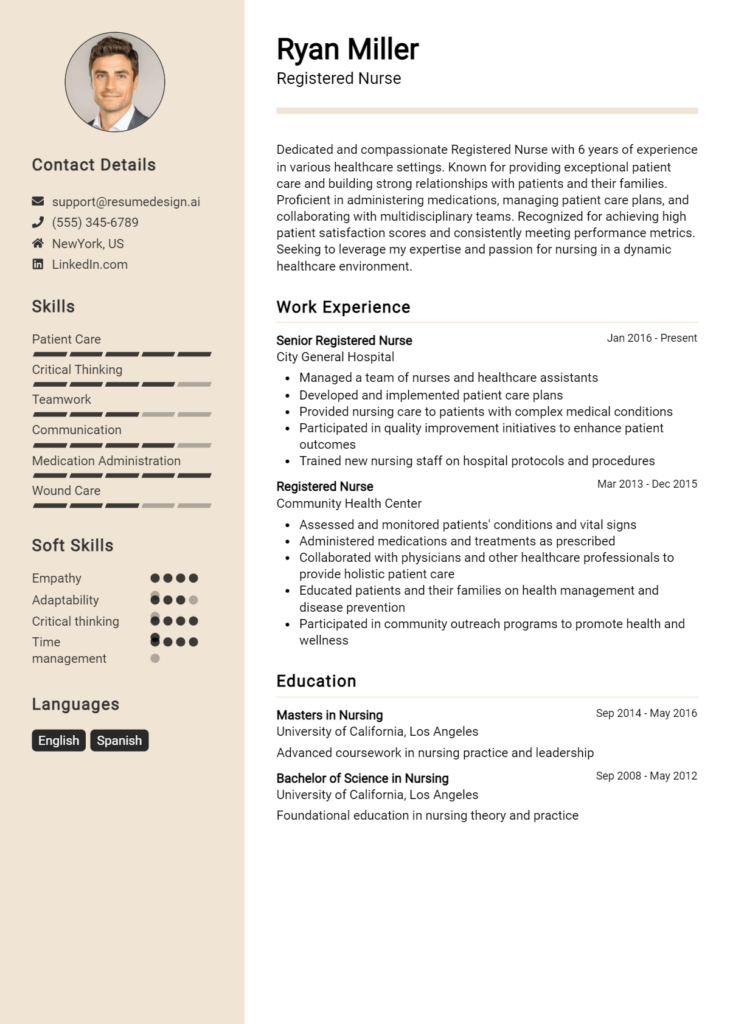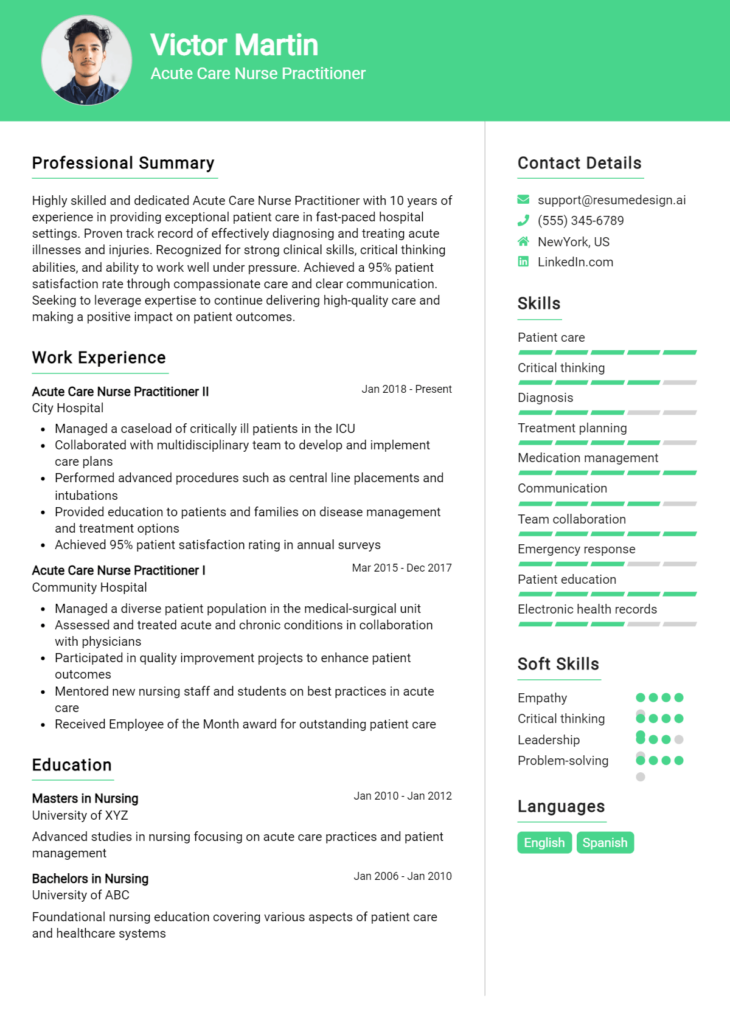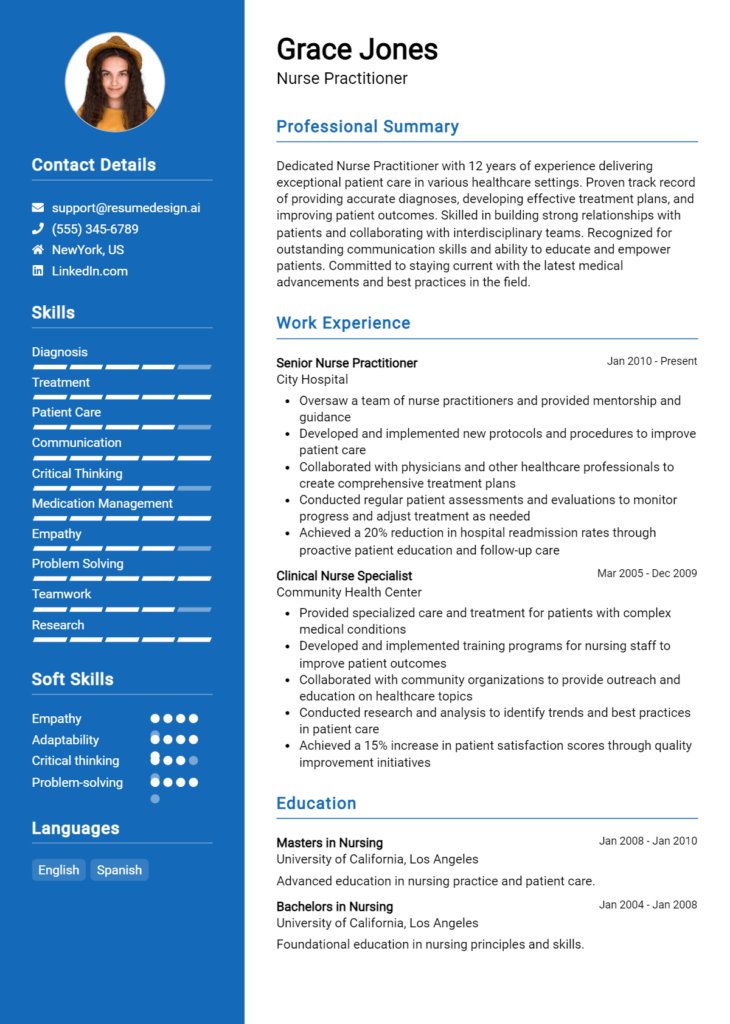Telemetry Nurse Core Responsibilities
A Telemetry Nurse plays a crucial role in monitoring patients with cardiac conditions, requiring a unique blend of technical, operational, and problem-solving skills. These professionals bridge various departments, collaborating closely with physicians and other healthcare staff to ensure optimal patient care. Key responsibilities include interpreting cardiac rhythms, managing telemetry equipment, and responding to critical situations swiftly. A well-structured resume can effectively highlight these qualifications, showcasing how they contribute to the organization's goals of patient safety and quality care.
Common Responsibilities Listed on Telemetry Nurse Resume
- Monitor and interpret cardiac telemetry data.
- Assess patients' vital signs and report changes.
- Administer medications and treatments as prescribed.
- Collaborate with interdisciplinary teams to develop patient care plans.
- Educate patients and families about cardiac health and procedures.
- Document patient progress and interventions accurately.
- Respond promptly to emergency situations and alarms.
- Maintain and troubleshoot telemetry equipment.
- Perform comprehensive patient assessments.
- Participate in quality improvement initiatives.
- Provide support during diagnostic procedures.
- Maintain compliance with healthcare regulations and standards.
High-Level Resume Tips for Telemetry Nurse Professionals
In the competitive field of nursing, a well-crafted resume is essential for Telemetry Nurse professionals looking to make a lasting first impression on potential employers. Your resume serves as a critical marketing tool that showcases your skills, achievements, and the unique qualifications that set you apart in a specialized area of healthcare. A strong resume not only highlights your experience in telemetry but also emphasizes your ability to monitor patients' vital signs, interpret data, and respond to emergencies effectively. This guide will provide practical and actionable resume tips specifically tailored for Telemetry Nurse professionals, helping you create a document that stands out in the hiring process.
Top Resume Tips for Telemetry Nurse Professionals
- Tailor your resume to match the job description by incorporating relevant keywords and phrases that align with the specific role.
- Highlight your telemetry experience prominently, including the types of monitoring systems you’ve worked with and any specialized training received.
- Quantify your achievements, such as the number of patients monitored or improvements in patient outcomes due to your interventions.
- Showcase industry-specific skills, such as ECG interpretation, medication administration, and critical thinking abilities.
- Include certifications relevant to telemetry nursing, like BLS, ACLS, and telemetry-specific training or certifications.
- Utilize a clear and professional format that enhances readability, making it easy for hiring managers to quickly find key information.
- Emphasize teamwork and collaboration skills, as telemetry nurses often work closely with interdisciplinary teams to provide optimal patient care.
- Incorporate any experience with technology, such as electronic health records (EHR) or telemetry monitoring equipment, to demonstrate your proficiency.
- Keep your resume concise, ideally one page, focusing on the most relevant experiences and skills to maintain the reader's attention.
- Proofread carefully to eliminate any errors in spelling or grammar, as attention to detail is crucial in the nursing profession.
By implementing these tailored tips, you can significantly enhance your chances of landing a job in the Telemetry Nurse field. A polished and focused resume will not only highlight your qualifications but also demonstrate your commitment to providing exceptional patient care, making you a strong candidate in the eyes of potential employers.
Why Resume Headlines & Titles are Important for Telemetry Nurse
The role of a Telemetry Nurse is critical in monitoring and assessing patients with cardiovascular issues, making it essential for candidates to present their qualifications effectively. A well-crafted resume headline or title serves as the first impression for hiring managers, offering a concise snapshot of a candidate's expertise and suitability for the role. A strong headline can immediately capture attention, summarizing key qualifications in a single impactful phrase. It should be concise, relevant, and directly related to the Telemetry Nurse position being applied for, ensuring that the candidate stands out in a competitive job market.
Best Practices for Crafting Resume Headlines for Telemetry Nurse
- Keep it concise: Aim for a headline that is no more than 10-12 words.
- Be specific: Use terminology that reflects the Telemetry Nurse role and responsibilities.
- Highlight key skills: Focus on the most relevant skills or certifications that align with the job description.
- Incorporate metrics: If possible, include quantifiable achievements to add impact.
- Use action words: Start with dynamic verbs to convey a sense of proactivity and expertise.
- Tailor to the job: Customize your headline for each application to reflect the specific requirements of the position.
- Reflect your experience level: Indicate whether you are an entry-level, mid-career, or experienced professional.
- Avoid clichés: Steer clear of overused phrases that do not add value to your headline.
Example Resume Headlines for Telemetry Nurse
Strong Resume Headlines
Compassionate Telemetry Nurse with 5+ Years in Critical Care
Experienced Telemetry Nurse Skilled in ECG Monitoring and Patient Assessment
Dedicated Telemetry Nurse with Proven Record in Patient Outcome Improvement
Certified Telemetry Nurse with Expertise in Acute Care and Cardiac Monitoring
Weak Resume Headlines
Nurse Looking for a Job
Healthcare Professional
Telemetry Nurse with Some Experience
Strong headlines are effective because they clearly communicate the candidate's specific skills, experience, and accomplishments relevant to the Telemetry Nurse position, thus appealing to hiring managers looking for qualified candidates. In contrast, weak headlines fail to impress due to their vagueness and lack of detail, making it difficult for employers to assess the candidate's suitability for the role at a glance. By crafting a compelling and targeted headline, candidates can significantly enhance their chances of being noticed in a crowded job market.
Writing an Exceptional Telemetry Nurse Resume Summary
A well-crafted resume summary is crucial for Telemetry Nurses as it serves as a snapshot of qualifications and expertise that can make a significant impact on hiring managers. A strong summary quickly captures attention by highlighting key skills, relevant experience, and notable accomplishments that align with the specific job role. It should be concise yet impactful, effectively summarizing the candidate's value proposition while demonstrating a direct connection to the needs of the position they are applying for.
Best Practices for Writing a Telemetry Nurse Resume Summary
- Quantify Achievements: Use specific numbers or statistics to illustrate your impact, such as patient outcomes or improvements in care efficiency.
- Focus on Relevant Skills: Highlight essential skills such as ECG interpretation, patient monitoring, and critical care experience that are pertinent to telemetry nursing.
- Tailor for the Job Description: Customize your summary to reflect the specific requirements and responsibilities outlined in the job posting.
- Use Action-Oriented Language: Start with strong action verbs that convey confidence and decisiveness.
- Highlight Certifications and Training: Mention any relevant certifications, such as BLS or ACLS, that enhance your qualifications as a Telemetry Nurse.
- Showcase Soft Skills: Include essential soft skills like communication, teamwork, and problem-solving that are vital in a healthcare environment.
- Keep It Concise: Aim for 3-5 sentences that deliver your message effectively without overwhelming the reader.
- Maintain Professional Tone: Use clear, professional language that reflects your expertise and dedication to patient care.
Example Telemetry Nurse Resume Summaries
Strong Resume Summaries
Dedicated Telemetry Nurse with over 5 years of experience in acute care settings, successfully managing up to 10 patients simultaneously. Achieved a 30% reduction in patient readmissions through proactive monitoring and patient education initiatives.
Compassionate Telemetry Nurse with a proven track record of delivering exceptional patient care in high-pressure environments. Certified in ACLS and proficient in interpreting cardiac rhythms, leading to timely interventions that improved patient outcomes by 25%.
Results-driven Telemetry Nurse with extensive experience in critical care, skilled in using advanced monitoring equipment. Played an integral role in a team that implemented a new patient monitoring protocol, which decreased response times by 15% and enhanced overall patient satisfaction scores.
Weak Resume Summaries
Experienced nurse with telemetry skills seeking a new opportunity in a hospital.
Telemetry Nurse looking for a position where I can use my nursing skills to help patients.
The strong resume summaries are considered effective because they provide specific details about the candidate's accomplishments, skills, and experiences that directly relate to the Telemetry Nurse role. They quantify results, demonstrate the impact on patient care, and showcase relevant certifications, making them compelling for hiring managers. In contrast, the weak summaries lack detail and specificity, making them too generic and failing to highlight the candidate's unique qualifications or achievements.
Work Experience Section for Telemetry Nurse Resume
The work experience section of a Telemetry Nurse resume is critical in demonstrating the candidate's technical proficiency, leadership capabilities, and commitment to delivering high-quality patient care. This section not only highlights the roles and responsibilities undertaken but also serves as a platform to showcase specific achievements that can be quantified. By aligning work experiences with industry standards and emphasizing measurable results, candidates can effectively communicate their value to potential employers and stand out in a competitive job market.
Best Practices for Telemetry Nurse Work Experience
- Clearly define roles and responsibilities in each position held.
- Quantify achievements with metrics such as patient outcomes, efficiency improvements, and team performance.
- Highlight technical skills relevant to telemetry nursing, such as EKG interpretation and cardiac monitoring.
- Emphasize collaboration with interdisciplinary teams to deliver comprehensive patient care.
- Use action verbs to convey a sense of proactivity and leadership.
- Tailor experiences to match the job description and requirements of the position applied for.
- Include continuing education and certifications that enhance technical expertise.
- Showcase any mentorship or training roles taken on within the team or organization.
Example Work Experiences for Telemetry Nurse
Strong Experiences
- Managed a telemetry unit with a 20% reduction in patient readmission rates over one year by implementing evidence-based care protocols.
- Led a team of 10 nurses during a quality improvement initiative that improved patient satisfaction scores by 15% within six months.
- Performed EKG interpretations and telemetry monitoring for over 300 patients monthly, ensuring timely interventions and reducing code blue events by 30%.
- Collaborated with cardiologists to develop and implement a new telehealth program, increasing access to care for rural patients by 40%.
Weak Experiences
- Responsible for patient care in the telemetry unit.
- Worked with doctors and other nurses on various tasks.
- Helped with monitoring patients and reporting data.
- Participated in training sessions for new nurses.
The examples provided are considered strong because they articulate specific achievements and outcomes that clearly demonstrate the candidate's impact on patient care and operational efficiency. These experiences are quantifiable, providing potential employers with concrete evidence of the nurse's capabilities. In contrast, the weak experiences lack detail and measurable results, making it difficult to assess the candidate's actual contributions and effectiveness in their roles.
Education and Certifications Section for Telemetry Nurse Resume
The education and certifications section of a Telemetry Nurse resume holds significant importance as it showcases the candidate's academic background, industry-relevant certifications, and commitment to continuous learning. This section is crucial in demonstrating to potential employers that the candidate possesses the necessary knowledge and skills to excel in telemetry nursing. By providing detailed information about relevant coursework, certifications, and specialized training, candidates can greatly enhance their credibility and align themselves with the specific requirements of the job role, making them more attractive to hiring managers.
Best Practices for Telemetry Nurse Education and Certifications
- Prioritize relevant degrees such as a Bachelor of Science in Nursing (BSN) or an Associate Degree in Nursing (ADN).
- Include industry-recognized certifications like the Basic Life Support (BLS) and Advanced Cardiovascular Life Support (ACLS).
- List any additional specialty certifications, such as the Certified Cardiac Rehabilitation Specialist (CCRS).
- Highlight specific coursework related to cardiac care, telemetry monitoring, and pharmacology.
- Provide details about ongoing education or professional development courses to show commitment to learning.
- Be concise but thorough; ensure that each entry provides clear relevance to the telemetry nursing field.
- Use a chronological format to display your educational journey, showing the most recent accomplishments first.
- Tailor the section to match the job description, emphasizing qualifications that align with employer expectations.
Example Education and Certifications for Telemetry Nurse
Strong Examples
- Bachelor of Science in Nursing (BSN), University of Health Sciences, Graduated May 2021
- Certified Critical Care Nurse (CCRN), American Association of Critical-Care Nurses, Certification Number: 123456789
- Advanced Cardiovascular Life Support (ACLS), American Heart Association, Certification Valid Until: July 2025
- Relevant Coursework: Cardiac Physiology, Advanced Telemetry Monitoring, and Pharmacology for Cardiac Patients
Weak Examples
- Associate Degree in Liberal Arts, Community College, Graduated June 2018
- Certified Nursing Assistant (CNA), Certification Obtained: 2017
- Basic Life Support (BLS), Expired Certification from 2019
- Coursework in General Psychology and Sociology
The strong examples are considered effective because they directly relate to the qualifications and skills needed for a Telemetry Nurse role, showcasing relevant education and up-to-date certifications. In contrast, the weak examples demonstrate a lack of focus on telemetry-specific qualifications, featuring outdated or irrelevant credentials that do not align with the demands of the position. By emphasizing pertinent degrees and current certifications, candidates can significantly strengthen their applications and appeal to potential employers.
Top Skills & Keywords for Telemetry Nurse Resume
As a Telemetry Nurse, possessing the right skills is essential for delivering high-quality patient care in a fast-paced environment. The combination of both soft and hard skills will not only help you excel in your role but also enhance your resume, making it stand out to potential employers. Soft skills such as communication and empathy are crucial for building rapport with patients and their families, while hard skills like ECG interpretation and medication administration ensure that you can perform the technical aspects of your job effectively. A well-rounded skill set can greatly improve your chances of landing the desired position in telemetry nursing.
Top Hard & Soft Skills for Telemetry Nurse
Soft Skills
- Effective communication
- Compassionate patient care
- Critical thinking
- Attention to detail
- Team collaboration
- Time management
- Adaptability
- Problem-solving
- Emotional intelligence
- Stress management
Hard Skills
- ECG interpretation
- Medication administration
- Patient monitoring
- IV therapy proficiency
- Basic life support (BLS) certification
- Advanced cardiac life support (ACLS) certification
- Knowledge of telemetry equipment
- Data analysis and interpretation
- Electronic health record (EHR) management
- Infection control protocols
Incorporating these skills into your resume will not only showcase your qualifications but also reflect your preparedness for the demands of the role. Additionally, highlighting your relevant work experience can further strengthen your application, demonstrating your ability to apply these skills in real-world scenarios.
Stand Out with a Winning Telemetry Nurse Cover Letter
Dear [Hiring Manager's Name],
I am writing to express my enthusiasm for the Telemetry Nurse position at [Hospital/Clinic Name] as advertised on [Job Board/Company Website]. With [X years] of experience in telemetry nursing and a strong commitment to providing high-quality patient care, I am excited about the opportunity to contribute to your team. My background in monitoring cardiac patients, combined with my skills in critical thinking and patient assessment, positions me well to excel in this role.
Throughout my career, I have developed a comprehensive understanding of cardiac monitoring systems and the nuances of interpreting telemetry data. In my previous role at [Previous Employer], I effectively managed a diverse patient population, ensuring that each patient received timely and appropriate interventions based on telemetry readings. My ability to collaborate with interdisciplinary teams allowed me to contribute to improved patient outcomes, particularly in high-pressure situations. I am adept at utilizing advanced technology and have always prioritized patient safety and comfort, which I believe aligns with the values upheld by [Hospital/Clinic Name].
Moreover, I am dedicated to continuous professional development, regularly participating in workshops and training to stay updated with the latest advancements in telemetry nursing. I am also passionate about patient education, often taking the initiative to guide patients and their families through complex information regarding cardiac health and telemetry monitoring. I am confident that my proactive approach and compassionate nature would make me a valuable asset to your nursing team.
Thank you for considering my application. I look forward to the possibility of discussing how my experience and skills can contribute to the exceptional care provided at [Hospital/Clinic Name]. I am eager to bring my dedication to patient care and my telemetry expertise to your esteemed institution.
Sincerely,
[Your Name]
[Your Contact Information]
[Your LinkedIn Profile or Professional Website]
Common Mistakes to Avoid in a Telemetry Nurse Resume
When crafting a resume as a Telemetry Nurse, it’s essential to highlight your specialized skills and experience effectively. However, many candidates inadvertently make mistakes that can detract from their qualifications. Avoiding these common pitfalls can significantly enhance your chances of landing an interview. Here are some mistakes to watch out for:
Neglecting to Include Relevant Certifications: Failing to list certifications such as Basic Life Support (BLS) or Advanced Cardiovascular Life Support (ACLS) can make your resume less competitive in a field that values these credentials.
Using Generic Language: Overly broad descriptions of your responsibilities can come across as vague. Instead, use specific language that highlights your unique contributions and skills in telemetry nursing.
Omitting Quantifiable Achievements: Not including measurable outcomes, such as improved patient monitoring efficiency or reduced response times, can weaken your impact. Quantifying your achievements demonstrates your effectiveness as a nurse.
Ignoring Keywords from Job Descriptions: Tailoring your resume to include keywords from the job listing is crucial. Many employers use applicant tracking systems that filter resumes based on these keywords.
Listing Duties Instead of Achievements: Simply stating your duties without emphasizing what you accomplished can diminish your resume's effectiveness. Focus on how you improved patient care or enhanced team processes.
Using an Unprofessional Email Address: An email address that is not professional can give a poor first impression. Always use a simple and professional email format, ideally combining your name.
Failing to Highlight Soft Skills: Telemetry nursing requires strong communication and teamwork skills. Neglecting to mention these can overlook a significant aspect of your qualifications.
Inconsistent Formatting: A resume with inconsistent fonts, spacing, or bullet styles can appear unprofessional. Maintaining a clean and uniform format enhances readability and professionalism.
Conclusion
As a Telemetry Nurse, your role is critical in monitoring patients' vital signs and ensuring their safety during treatment. Key responsibilities include interpreting telemetry data, responding to alarms, collaborating with healthcare teams, and providing patient education. Given the high-stakes environment, having an impactful resume that highlights your skills and experience is essential for standing out in the job market.
In conclusion, if you're looking to enhance your career opportunities as a Telemetry Nurse, take a moment to review your resume. Make sure it reflects your expertise in cardiac monitoring, patient assessment, and your ability to work under pressure. Utilize available tools to create a polished and professional application that showcases your qualifications.
Check out the following resources to assist you in this process:
- Explore a variety of resume templates tailored for healthcare professionals.
- Use the resume builder to customize your resume easily and efficiently.
- Get inspired by resume examples specifically designed for Telemetry Nurses.
- Don't forget to enhance your application with a standout cover letter using our cover letter templates.
Take the first step towards advancing your career today by revising your resume with these helpful tools!

